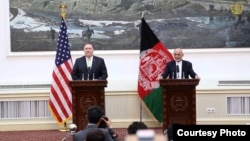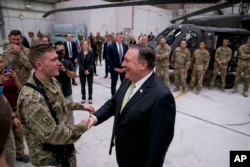U.S. Secretary of State Mike Pompeo on Monday pledged support for Afghanistan President Ashraf Ghani's efforts to open talks with the Taliban and reiterated Washington's readiness to facilitate the Afghan-led peace process.
Pompeo made a surprise stop in the Afghan capital, where he met with Ghani and other senior government officials before the two leaders addressed a joint news conference and agreed U.S. President Donald Trump's regional strategy of maintaining military pressure on the Taliban "is indeed working."
The strategy that Trump announced last August aims to convince the Taliban through diplomatic, military and social pressure that it cannot win on the battlefield and must engage in reconciliation talks with Kabul.
But the Taliban demands direct talks with the U.S. and dismisses leaders in Kabul as "American stooges," insisting intra-Afghan talks in the presence of foreign "occupation" forces in the country would be "pointless."
Pompeo and Ghani emphasized the peace process must be "Afghan-led and Afghan-owned." Pompeo again stopped short of rejecting the Taliban's demand for direct talks with Washington, saying the United States cannot run the process and the conflict cannot be settled from outside the country.
"So, the peace process will be Afghan-led. It will be amongst the Afghan people. ... Having said that, we are prepared to participate in that, to facilitate, to help the Afghan people resolve their differences and to arrive at a place where all of the Afghan people can have their voices heard and live in a society that is peaceful," Pompeo explained.
The top American diplomat visited Kabul amid renewed hopes that long-sought peace talks could be initiated, following last month's successful cease-fire between the Taliban and the Afghan government during the three-day Eid festivities.
Insurgent advances
The insurgents, however, ignored calls for extending the cease-fire and have intensified battlefield attacks since ending the unprecedented brief truce, overrunning new Afghan territory and inflicting heavy casualties on government forces.
When Pompeo's attention was drawn to insurgent advances and he was asked for the evidence to support assertions the Trump strategy is working, he cited improvement in the size and the capability of Afghan security forces and in strengthening the reforms inside the Afghan government.
"The work that we have done to demonstrate to the Taliban that the continuation of fighting will lead them to a bad outcome, not one that's in the best interests of the people in the regions where they operate, each of those are hallmarks of real progress," Pompeo answered.
Pompeo and Ghani also discussed preparations for the long-delayed Afghan parliamentary and provincial council elections in October.
Upcoming meeting
Pompeo visited Afghanistan before this week's scheduled conference of international Islamic scholars in Saudi Arabia, where participants are expected to call on the Taliban to quit violence in the name of religion and seek a peaceful end to the war.
But the Islamist insurgency has rejected the upcoming meeting in Jeddah and other such gatherings as a U.S. ploy to justify their "military occupation" of Afghanistan, weaken the insurgency, and seek legitimacy for the "puppet" rulers in Kabul.
"The Islamic Emirate of Afghanistan [the Taliban] considers this process under the title of conferences of the Islamic Scholars as an absolute anti-Islamic U.S. process, whereas its idea, logistical support and implementation is directly led by the U.S. itself," according to a Taliban statement.
Pompeo made his first visit to Afghanistan since he became secretary of state in April. He stopped in Kabul during his tour of Asian countries, including North Korea and Vietnam.





